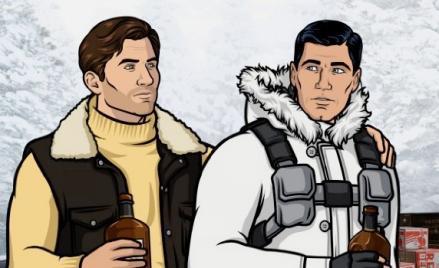In his review of “The Wind Cries Mary,” last Thursday’s episode of Archer, Todd VanDerWerff accused the show of “gay panic” and noted that “the sexual politics of the storyline are kind of tortured and convoluted.” He’s absolutely right—but, to quote Archer himself, that’s really just the tip (of the iceberg, that is). Archer has played a dangerous game with gay humor throughout its entire run, with “The Wind Cries Mary” simply revealing more than usual about the show’s uneasy relationship with homosexuality.
On the one hand, Archer does feature an openly gay character (Ray) who also happens to be voiced by the show’s creator, Adam Reed. Ray seems to be quite competent and sharp; he may not be a role model, but he’s an interesting, rounded character, so far as either of those terms apply to the Archer universe. Moreover, most gay-related humor on Archer involves Mallory Archer’s homophobic jibes at Ray, which are received with disgust by the other characters. We’re meant to laugh at her homophobia, not with it.
On the other hand, Archer often plays off the kind of homophobic stereotypes that historically fostered so much fear and hatred toward gay people. Ray is often depicted as hypersexualized, and while he’s not alone in being oversexed (see: Pam), the trait feels quite loaded when applied to a gay man. That’s not to say Reed should handle Ray with kid gloves: Most characters on Archer are, after all, charmingly twisted. All too often, however, Ray’s actions play into distorted societal misconceptions about gay people where Archer’s or Malory’s misdeeds would merely be absurdly funny. That might be the price Reed pays for bold comedy, but it is, at times, a high one given Ray’s more shocking antics. Most notably, in “Blood Test,” Ray casually raped an unconscious Cyril, with no apparent character motivation other than an urge to have sex. Later, Ray is stricken with paraplegia from the waist down, a rather obvious form of symbolic emasculation. That’s troubling. Anyone with a faint knowledge of LGBT history will know that gays were long demonized as hypersexual beasts unable to control their impulses, and as sexually aggressive threats to straight men, and that one historic punishment for sodomy was castration. Ray’s character arc has distressingly loud echoes of such discrimination–as did “The Wind Cries Mary.”
In last week’s episode, perhaps Reed was attempting to circumvent potential allegations of homophobia by making Luke Archersexual rather than homosexual, but I think he failed: Luke reads as gay, comically so, right down to renovating a B&B in Vermont. And his attraction to Archer is so strong that he’s willing to murder his fellow agents and betray his country. Archer is a comedy, and all of this was meant to be taken lightly. But fears of such uncontrollable hypersexuality drove LGBT intolerance for centuries, and it’s probably a little too soon to play them for laughs.
Maybe the episode would have been less fraught had it not ended with the (ostensibly comical) revelation that Luke once raped Archer. To understand how risky that twist is, just tweak the plot line slightly: imagine a show in which a hypersexualized black man killed a bunch of people so he could have sex with a white woman. Now imagine the final scene’s twist—years ago, the black man raped the white woman while she was unconscious! Would we laugh? I’m not so certain. That arc would play on two powerful taboos: the black man with uncontrollable sexual urges for white women, and male-on-female rape (which plagues society and dominates political discourse). Both of these taboos are probably too strong, too appalling to be used as comic fodder. But we laugh at Archer’s gay-rape twist because Archer is a dolt, and everybody’s silly, and Luke was just a guest character voiced by Timothy Olyphant, and, hey, aren’t we basically over anti-gay discrimination, anyway?
I think Reed feels comfortable injecting this kind of startlingly homophobic humor into his show because it also features an openly gay character. Actually, I think he feels entitled to do it. He shouldn’t. Archer derives many of its laughs from its political incorrectness, which is great–most fans (myself included) revel in its frequent bursts of deeply transgressive humor. But “The Wind Cries Mary” dove too deep into the waters of still-fresh bigotry for my taste. Tolerant viewers might watch it with a grin and shrug off its problematic undertones. But for less tolerant viewers, the episode reinforces the notion that an oversexed monster lurks inside every gay man. We should expect more than that from Archer. What makes the show great is that Adam Reed usually doesn’t play stereotypes for easy laughs. Instead, when the show’s at its best, he explores them and explodes them in discomfiting ways. That kind of bold comedy, of course, can’t always work. So perhaps we should forgive Reed his mistakes and appreciate the fact that his show exists perpetually in the danger zone.
